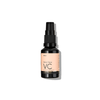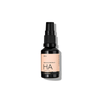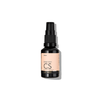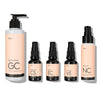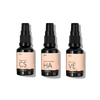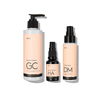Glow Up Daily: Your Ultimate Skincare Guide
With so many products and routines in skincare, it really can get very overwhelming. This turns it into a kind of uphill task for both beginners and enthusiasts alike to find the right daily skincare routine. Fether is all about simplicity and high performance; it shows you how to do your ultimate skincare journey.

Know your Skin Type
Knowing your skin type is essential before moving on to specifics in terms of routines and products. It makes one aware of what kind of products an individual needs to use and how the interaction would work out.
Common Skin Types
Normal Skin: Balanced in neither being too oily nor dry.
Oily Skin: This is a type that is prone to excess sebum production, leading to shine and possible acne.
Dry Skin: When your skin lacks enough moisture, it might feel tight or flaky.
Combination Skin: A mix of oily and dry areas, generally oily in the T-zone and dry on the cheeks.
Sensitive Skin: Easily irritable due to products or environmental factors.
Building Blocks of a Daily Skincare Routine
An effective skincare routine involves a few steps, all of which have a designated place. Here is how the basics one needs to perform broken down:
1. Cleansing
Cleansing is the most important and primary step of any skincare regime. It helps remove dirt, oil, and impurities which block pores and cause breakouts.
Types of Cleansers
Foaming Cleansers: Most suitable for oily and combination skin. They work well in removing excess oils from the skin without stripping off its natural oils.
Gel Cleanser: Mainly used for sensitive, red, and acne-prone skin; it provides a deep cleanse, yet gentle.
Cream Cleansers: They are good for dry and sensitive skin, since they moisturise while cleaning.
Know more: Why Cleansing is Key to Healthy and Radiant Skin
2. Exfoliating
Exfoliation helps remove dead skin cells from your face and accelerates cell turnover, leaving you with a fairer and brighter skin tone. Though it works, do it in moderation as it can be very irritating.
Types of Exfoliants
Physical Exfoliants: These consist of tiny particles that help scrub away dead skin cells physically. Use with caution to avoid micro-tears.
Chemical Exfoliants: These include AHAs, which are Alpha Hydroxy Acids, and BHAs, which stand for Beta Hydroxy Acids. It dissolves dead skin cells without abrasive scrubbing.
3. Toning
Toners help adjust the pH balance of the skin, rid the skin of remaining impurities, and prepare it for better absorption of the next products that will be used.
Types of Toners
Hydrating Toners: Ingredients include hyaluronic acid to boost moisture.
Astringent Toners: May consist of alcohol or witch hazel; these are good for oily skin or acne-prone skin but can be drying.
Exfoliating Toners: Soft exfoliation to brighten with mild acids.
4. Moisturising
Moisturisers are for both hydration and locking in that moisture for healthy, supple skin. Find one that works best for you based on your skin type.
Types of Moisturisers
Gel Moisturisers: Lightweight, suited for oily and combination skin types.
Cream Moisturisers: Rich and enriching for dry and sensitive skin types.
Lotion Moisturisers: A well-balanced choice for normal skin.
Know more: A Guide to Choosing the Perfect Face Moisturiser
5. Sun Protection
Sunscreen is not an option; it is a must. It prevents premature ageing and reduces the risk of skin cancer by keeping harmful UV rays at bay.
Types of Sunscreens
Chemical Sunscreens: These sunscreens absorb UV radiation and then change it into heat. Because they are lightweight, they are less likely to leave behind white residue.
Physical Sunscreens: They contain zinc oxide or titanium dioxide, which physically filters out UV rays. They are particularly indicated for sensitive skin types but are known to sometimes leave white residues on the skin.
Know more: The Essential Reasons to Never Skip Sunscreen
Tailoring Your Routine to Your Skin Type
Normal Skin
- Cleanser: Gentle foaming cleanser.
- Exfoliant: Mild chemical exfoliant twice a week.
- Toner: Hydrating toner.
- Moisturiser: Light lotion moisturiser.
- Sunscreen: Broad-spectrum SPF 30 or higher.
Oily Skin
- Cleanser: Oil controlling gel cleanser.
- Exfoliant: BHA exfoliant thrice a week.
- Toner: Astringent toner.
- Moisturiser: Oil-free gel moisturiser.
- Sunscreen: Matte-finish SPF 30 or higher.
Dry Skin
- Cleanser: Creamy cleanser.
- Exfoliant: AHA exfoliant once a week.
- Toner: Hydrating toner.
- Moisturiser: Rich cream moisturiser.
- Sunscreen: Hydrating SPF 30 or higher.
Combination Skin
- Cleanser: Balancing gel cleanser.
- Exfoliant: Mild chemical exfoliant, twice a week.
- Toner: Hydrating toner on dry spots, astringent on oily spots.
- Moisturiser: Light lotion on the T-zone and a richer cream on the cheeks.
- Sunscreen: Broad spectrum SPF 30 or higher.
Sensitive Skin
- Cleanser: Fragrance-free gentle cleanser.
- Exfoliant: PHA exfoliant, once a week.
- Toner: Soothing and alcohol-free toner.
- Moisturiser: Fragrance-free and hypoallergenic cream.
- Sunscreen: Physical sunscreen containing zinc oxide.
Boosting Your Routine with Targeted Treatments
Serums
Serums are concentrated treatments, addressing issues in your skin like ageing, pigmentation, and hydration.
 Types of Serums
Types of Serums
- Vitamin C Serum: Brightens and protects against environmental damage.
- Hyaluronic Acid Serum: Deeply hydrates and plumps the skin.
- Retinol Serum: Encourages cell turnover and reduces signs of ageing
Masks
Face masks offer an extra boost to your skincare routine, targeting everything from hydration to detoxification.
Types of Masks
- Clay Masks: These are best for oily, acne-prone skin for extra oil absorption. Sheet Masks: Soaked in serums to hydrate and nourish the skin.
- Overnight Masks: They work on moisturising and repairing while one sleeps.
Eye Creams
The skin around one's eyes is very delicate and easily prone to early ageing. Using a specialised eye cream can help to reduce puffiness, dark circles, and fine lines.
Types of Eye Creams
- Hydrating Eye Creams: Ingredients include hyaluronic acid or peptides.
- Brightening Eye Creams: Ingredients are vitamin C or caffeine.
- Anti-aging Eye Creams: Ingredients are retinol or peptides.
Lifestyle Tips for Glowing Skin
Diet and Hydration
What you eat and drink could make all the difference in your skin.
- Hydrate: Drink tons of water to get your body flushed out and let your skin be hydrated from within.
- Healthy Diet: Eat clean and well-balanced food, which is full of fruits, vegetables, lean proteins, and healthy fats.
- Limit Sugar and Processed Foods: These can inflame and cause breakouts.
Sleep and Stress Management
- Adequate Sleep: Get 7-9 hours of good sleep each night.
- Stress Management: Engage in de-stressing activities such as yoga, meditation, and deep breathing to manage your stress levels since it may lead to problematic skin.
Common Skincare Myths
Myth 1: Oily Skin Doesn't Need Moisturiser
Even oily skin needs moisture. For instance, skipping moisturiser may leave one with an overproduction of oil on the skin.
Myth 2: The More Expensive, the Better
Cost does not depict quality. In most cases, some inexpensive products would be just as good, or even superior.
Myth 3: You Only Need Sunscreen on Sunny Days
UV can easily travel through clouds, so sunscreen is a daily requirement and use is not dependent on the weather.
Conclusion
Get ready for glowing, healthy skin, patiently and persistently built by using the right skincare products according to your skin type. Use this ultimate skincare guide to help you create a routine that not only can deal with your unique needs but also enhance and highlight your natural beauty.
Final Tips
- Always patch test new products on a small area of skin to check if you have a reaction to it.
- Listen to Your Skin: Based on the feel and response, so goes the routine.
- Stay Informed: Keep up-to-date on the latest skincare research and trends so that at all times, you are making wise decisions.
Glow up in a day in a routine catering to your unique skin needs, and let that radiation show.
